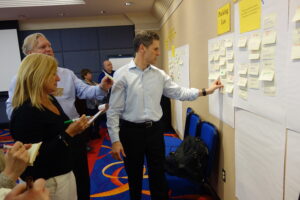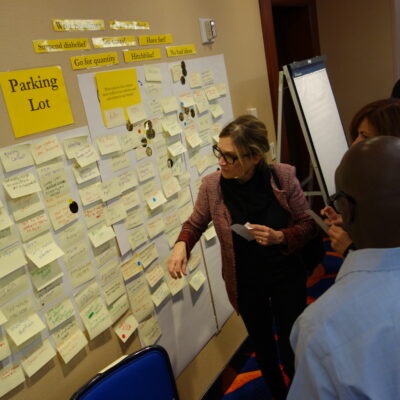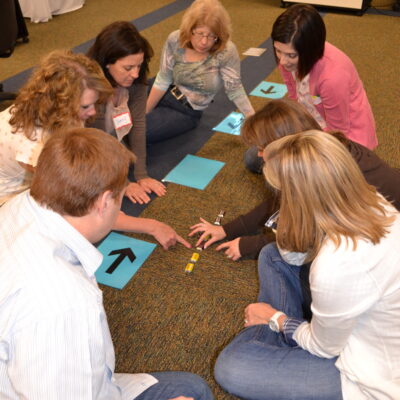High performing teams are what every business strives for, but it’s often an elusive goal. Many struggle to build teams that can overcome every challenge and achieve their goals. However, it’s not as hard as it may seem. In our latest episode of Team Building Saves the World, How to Have Difficult Conversations, we spoke with social dynamics expert Aden Nepom about the correlation between performance and psychological safety. She noted this connection, saying:
“It’s not who’s on the team, but it’s how the team functions. And the way to summarize that great team function is that broad term psychological safety, which is largely misunderstood.”
In today’s article, we’re going to provide a guide on how to build a high performing team. We’ll look at what a high performance team is, the characteristics of them, and detail everything you need to do to build your own high performing team.
What is a High Performing Team?
Let’s start at the beginning—what is a high performing team? The most obvious element is that they perform well regularly and consistently. They do great work, meet/exceed expectations, and accomplish their goals. There’s more to it than that though.
High functioning teams are also aligned in various ways, such as their goals, expectations, purpose, skills, and more. They work together as one, collaborating and leveraging their strengths to achieve their universal goals. They also tend to be highly adaptable, with team members able to fill multiple different roles within the team depending on what’s necessary.
Ultimately, high performance teams are essentially a dream team; a group of people who are aligned in many ways, highly skilled, and able to overcome their obstacles and achieve their goals through teamwork and communication.
Characteristics of High Performing Teams
High performance teams have certain characteristics in common, and these characteristics are what enable them to be such great teams. So let’s look at those characteristics of high performing teams in detail.
Defined Roles and Responsibilities
Team members need to have owned responsibilities so they can focus their efforts on their specific duties and feel like they’re the expert in at least one aspect of this business.
Clearly Defined Goals and Priorities
Well-defined goals and priorities help align teams and give them a common vision to strive for without internal team conflict.
Clear and Respectful Communication
Open, honest, clear, and respectful communication is a necessity for teams to operate at their full potential. Employees should be able to handle conflict resolution without getting leadership involved.
Healthy Flow of Feedback and Recognition
Feedback and recognition help team members improve upon their work, better themselves, and get the credit they deserve. This includes constructive criticism – but only when it’s done correctly.
Emotional Intelligence and Trust
Team members who have emotional intelligence are more likely to understand why other employees act the way they due and are more likely to empathsize with and understand others. This makes for less clouded judgement when making important decisions.
Continuous Innovation and Adaptability
The best teams are always trying to innovate, come up with new ideas, and better themselves. Teams that have adaptive skills are able to take on new challenges without fear of failure.
Cross-Functional Collaboration
High performing teams are usually pretty connected to other teams in the organization. This helps them understand their role in the overall organization and builds respect amongst all teams and employees.
How to Build a High Performing Team
Now, let’s look at how to build a high performing team. There are a multitude of things to focus on, but we’re going to go through them one-by-one.
Define What High Performance Means for Your Team
One of the first things high performance teams do is define what high performance means to them. Every team and organization is unique, so their performance goals will be different as well. Teams should have clear, measurable objectives that align with the company’s mission and the team’s purpose.
They also need to understand their team dynamics. Teams are diverse, with individuals having different strengths and offering unique perspectives. Those differences should be used as an advantage, complementing each other’s skills to achieve high performance.
Additionally, leadership should set clear expectations. Team members should know exactly what is expected regarding performance, communication, and collaboration so they are all on the same page and can work together.
Foster a Culture of Psychological Safety
A culture of psychological safety at work is key for high performing teams. Team members need to feel comfortable voicing their opinions, asking questions, providing feedback, and taking risks. Nepom highlighted this, saying:
“Psychological safety is basically the sense that you are in an environment where your opinions are valued. That means that you can speak up when things aren’t working or going well. You can have hard conversations, give direct feedback, poke holes, and share ideas. And at the same time, bring your ideas to the table and know that people will take those ideas seriously.”
Teams need to communicate freely, have trust and respect built through active listening and empathy, and supportive leaders who can be vulnerable and provide feedback. These are all things that take time to achieve, but they are necessary.
Promote Collaboration and Teamwork
It’s hard to overstate the importance of collaboration and teamwork. It’s impossible to have a high functioning team without them, and they are at the heart of any great team and organization. Nepom talked about this during our conversation, saying:
“I’ve seen teams work together—even just through a team building experience—and come out of that with a new understanding of each other.”
“And I’ve also seen people go through a facilitated conversation around something that would have been really hard to talk about, but they come through with really clear objectives and the experience of having spoken in an honest and transparent way towards the facts and the details and the things that matter to everybody, even when the opinion’s different and come to consensus.”
Collaboration and teamwork allow teams to leverage their diverse perspectives to find innovative solutions. Combined with cross-functional collaboration, it can create teams that are incredibly diverse and high performing.
Team building plays a role as well. Activities and events like Emotional Intelligence Team Building, DiSC Training, and the Do Good Bus can help teams learn more about themselves and each other, as well as strengthen interpersonal relationships.
Invest in Continuous Learning and Development
High performing teams are always learning and developing, personally and professionally. Without a focus on continuous learning and skill development, teams can stagnate and fall behind.
Businesses should provide ample training opportunities so team members can stay agile and adaptable. Programs such as Discover Your Strengths and Myers-Briggs Type Indicator are a great way to prioritize skill development.
Knowledge sharing is a good strategy as well. Mentorship programs and other peer-to-peer learning within teams can encourage growth and development while building bonds. You also should recognize and reward growth. Acknowledge individual and team achievements, reinforcing the importance of continuous improvement and showing teams that they will be rewarded for their accomplishments.
Monitor Performance and Provide Feedback
As is common with most things in business, monitoring performance and providing effective feedback is essential. You can’t improve and get better if you don’t evaluate your performance and find ways to improve via feedback.
Set-up regular check-ins so you can discuss progress and challenges one-on-one. These meetings can have a big impact on team members and their ability to grow and overcome challenges. Utilize the data you have available too. Key performance indicators (KPIs) can be used to more accurately identify specific areas for improvement, pinpointing the exact things employees need to work on.
And remember that feedback should be healthy and constructive. It needs to be specific, actionable, and focused on growth without being mean or belittling. For example:
Don’t Say: This isn’t good enough. Do better.
Say: You did a great job in the first two sections, but you’re lacking data to support your conclusion in section three. Try looking for more data to support your conclusion or consider changing your conclusion to more accurately reflect the data.
That feedback acknowledges the positives, points out a specific issue, and provides actionable advice to help the person improve their performance.
Adapt and Evolve
Lastly, high performing teams need to evolve and be adaptable. They need to be able to adjust to changes within the market or team, constantly trying to innovate, and reflect and make changes as necessary. Skill development and cross-functional training are great ways to improve adaptability, and team building events can help create a culture of innovation. These are tools you should utilize to create better and stronger teams.
None of that matters though if your teams can’t reflect on their success/missteps and make adjustments. Leaders need to lead by example and show team members how they can reflect and make changes for the future.
Build High Functioning Teams with TeamBonding
Every business wants high performing teams; they collaborate more effectively, are more innovative, adaptable, and have better outcomes for the business. Actually building those teams, on the other hand, is a struggle for many. By defining what high performance means and following the steps above, you can build a high performance team.
At TeamBonding, we’re ready to help you develop your dream team. Our experts have years of experience facilitating events to create better, stronger teams. So check out our events and take the first steps towards building a high performing team by getting in touch with us!

















